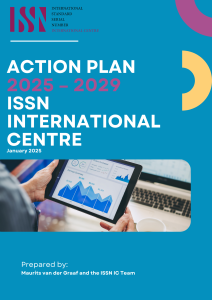|
ISSN Newsletter
|
|
Get Ready for 2030: Discover how we're going to change the way periodicals are identified!
|
|
 ISSN news |
|
|
The ISSN International Centre action plan 2025 – 2029 is now available !
|
The ISSN International Centre’s Action Plan for 2025-2029 outlines strategic objectives to improve global bibliographic data services for serial publications. Key initiatives include expanding the ISSN network, improving metadata quality and promoting preservation through the Keepers Registry. The plan emphasises service innovation for libraries and publishers, such as new identifiers, improved classification systems and targeted marketing. Sustainability goals focus on reducing environmental impact, while the use of AI and international standards ensures modernised identifier systems. The strategy builds on the achievements of 2020-2024, aiming for a robust, connected and innovative ISSN ecosystem by 2030.

|
|
|
|
|
ISSN International Centre Assessment of the 2020-2024 Strategic Plan is available!
|
The evaluation of the ISSN International Centre’s 2020-2024 Strategic Plan highlights key achievements, challenges and future goals. Achievements include the creation of cluster ISSNs for better resource tracking and the expansion of the Keepers Registry to 20 agencies for the preservation of digital and print serials. The network grew with the addition of six new National Centres, despite delays due to complex procedures. Challenges included limited progress in improving the interoperability of the ISSN portal through the integration of ISNIs and the implementation of persistent URLs. Future plans aim to build on these achievements while addressing outstanding issues.
|
|
|
|
 Digital preservation |
|
|
Reflections on Collection Development: One Year at CLOCKSS and Looking Ahead to 2025
|
Reflecting on a year at CLOCKSS, the focus of collection development in a dark archive involves proactive stewardship to ensure long-term preservation rather than immediate accessibility. Key priorities include addressing emerging scholarly trends, enhancing diversity and inclusion, and strengthening partnerships with publishers and libraries. The importance of a strong, engaged board for strategic direction was emphasized, along with the need for data-driven decision-making. For 2025, goals include adapting to open access trends, improving trigger mechanisms for user access, and ensuring financial sustainability while maintaining a mission-driven approach to preservation.
|
|
|
|
 Libraries |
|
|
Criteria for Bibliographic Databases in a Well-Functioning Scholarly Communication and Research Assessment Ecosystem
|

Recent developments in scholarly communication and research assessment show promising trends, such as the growth of preprints, open access, and more equitable publishing models. However, bibliographic databases like Web of Science and Scopus hinder innovation by excluding certain journals, like eLife, from their core indices. These databases prioritize traditional models, which limits the visibility of new approaches to research evaluation. To support innovation, databases should accommodate diverse scholarly platforms, recognize open peer review, and involve the research community in governance.
|
|
|
|
|
Empowering UMM al-Qura University’s Digital Transformation with MEDAD Institutional Effectiveness and Library Services Platform
|

In continuation of UMM AL-Qura University’s pursuit of supporting the digital transformation journey for all its educational and operational processes to continue achieving its strategic goals in a way that aligns with Saudi Vision 2030, UQU has chosen Naseej for Technology, the region’s leading knowledge and eLearning solutions provider, to provide it with the latest Quality, Assessment and Evaluation, Academic Accreditation, Library Management, Library Portal, and Digital Assets Repository. MEDAD solution has also been chosen by United Arab Emirates future ISSN centre.
|
|
|
|
|
25 Years in the DNB: The Journal Database
|

Since January 1, 2000, the German Serials Database aka Die Zeitschriftendatenbank (ZDB) has been processed online in the ILTIS system of the German National Library (DNB). This followed a project between DNB and the Berlin State Library (SBB) under tight deadlines. Since 2016, the German ISSN Centre has been assigning and cataloging ISSNs directly in ZDB. Since 2018, ZDB and the ISSN portal have included mutual links. Today, ZDB, now containing over 2.1 million titles and 5.5 million holdings, is the largest database for ongoing resources globally. It offers cooperative, freely accessible data. Over time, ZDB has expanded its services, including batch deliveries and metadata harvesting. In 2023, it became a “trusted partner” in WorldCat, further solidifying its role in bibliographic data.
|
|
|
|
|
Closing the language gap: automated language identification in British Library catalogue records
|

The British Library faced challenges in cataloging over 4.7 million records lacking language information. To address this, a statistical model based on Bayesian methods was used to predict the language of resources from catalogue metadata, such as titles. The model analyzed patterns in word usage across known language records to generate probabilities for language identification. Results varied by language, with high precision but varying recall. The project successfully added language codes to over 2 million records, improving curatorial work and resource discovery. Ongoing efforts aim to code millions more records.
|
|
|
|
 Open Science |
|
|
LA Referencia y Lyrasis colaboran para mejorar la gestión de repositorios DSpace en América Latina y España
|

LA Referencia y Lyrasis se enorgullecen de anunciar el lanzamiento de un proyecto conjunto que comenzó el 1 de enero de 2025. Este proyecto está enfocado en mejorar la capacidad, accesibilidad y gestión de plataformas de código abierto en América Latina y España. La iniciativa refleja un compromiso con el avance del acceso abierto al conocimiento en estas regiones, abordando desafíos clave relacionados con el mantenimiento de repositorios, actualizaciones y soporte a los usuarios.
LA Referencia and Lyrasis are proud to announce the launch of a joint project starting on January 1, 2025, focused on improving the capacity, accessibility and management of open-source platforms across Latin America and Spain. This initiative reflects a commitment to advancing open access to knowledge in these regions by addressing key challenges in repository maintenance, upgrades and user support.
|
|
|
|
 Open Access |
|
|
A decade of changes in OA and non-OA journal publication and production
|

This study examined trends in the publication of open access (OA) and non-OA journals and articles from 2011 to 2021 using SCImago Journal Rank (SJR) data. Results revealed that while the number of OA journals grew significantly, their share of total publications remained lower than non-OA journals. The number of non-OA publishers slightly decreased, while OA publishers increased rapidly. OA journal article production rose across all publisher sizes, with top publishers seeing the largest growth. Notably, MDPI emerged as a global leader in OA journal article publishing.
|
|
|
|
 Scholarly Communication |
|
|
Cabells Integration with LibKey Now Live
|

Cabells has been at the forefront of efforts to combat predatory publishing, providing researchers and librarians with trusted tools to identify and avoid journals that undermine scholarly integrity. Cabells has teamed up with Third Iron to integrate their predatory journal data into the LibKey ecosystem. This collaboration represents a leap forward in combating predatory publishing. By embedding Cabells’ data directly into LibKey’s user-friendly interface, researchers can easily make informed decisions about their sources, strengthening research efforts and supporting the mission to uphold the credibility of scholarly communication.
|
|
|
|
|
Scopus content policy and selection changes
|

Scopus ensures high-quality, up-to-date interdisciplinary content by adhering to a selection policy reviewed by an expert advisory board. The platform includes research from over 7,000 publishers globally, which is widely cited. Recent policy updates include removing the “2-year” condition for newly launched journals, encouraging journals to integrate Generative AI policies, and enhancing scrutiny for journal changes. These updates aim to improve transparency and maintain content quality. Scopus evaluates journals with input from the Content Selection & Advisory Board, but retains the right to revise selection decisions.
|
|
|
|
 Standards |
|
|
ORCID and Humanities: Celebrating the New Year with New Work Types
|

ORCID now offers a new set of work types that support a wider range of arts and humanities contributions. Non-STEM scholars have new opportunities to claim credit for outputs such as musical compositions, still and moving images, or teaching materials. They can be added via the ORCID Member API or by manual entry directly in the ORCID record. The new work types align with the Resource Types vocabulary maintained through the Confederation of Open Access Repositories (COAR).
|
|
|
|
|
TransliTAL #1 : les technologies de la langue au service de la qualité des notices en écriture cyrillique de la BULAC
|

Le projet TransliTAL, soutenu par l’Abes (Agence Bibliographique de l’Enseignement Supérieur), vise à améliorer la translittération des langues non latines dans le catalogue Sudoc grâce aux technologies de traitement automatique des langues (TAL) et à l’intelligence artificielle. Il corrige les erreurs de translittération, complète les notices anciennes et facilite la gestion des écritures cyrilliques, arabo-persanes et sinographiques. Mené par la BULAC (Bibliothèque universitaire des langues et civilisations) et le laboratoire de recherche ERTIM (Equipe de Recherche Textes, Informatique, Multilinguisme), ce projet cherche à harmoniser les données du catalogue, optimiser la recherche documentaire et résoudre les problèmes de rétro-translittération et d’identification erronée des langues. Le traitement des écritures arabo-persanes sera abordé ultérieurement.
|
|
|
|
 Events |
|
|
NISO Plus preconferences on AI, OA monographs, and JATS (Baltimore, USA, 10-12 February 2025)
|

NISO Plus 2025 meeting program includes three timely, collaborative pre-conferences (February 10) focused on generating ideas for solutions to challenges in the information community, including ethical use of AI and assessing the value of open access content.
Registration
|
|
|
|
|